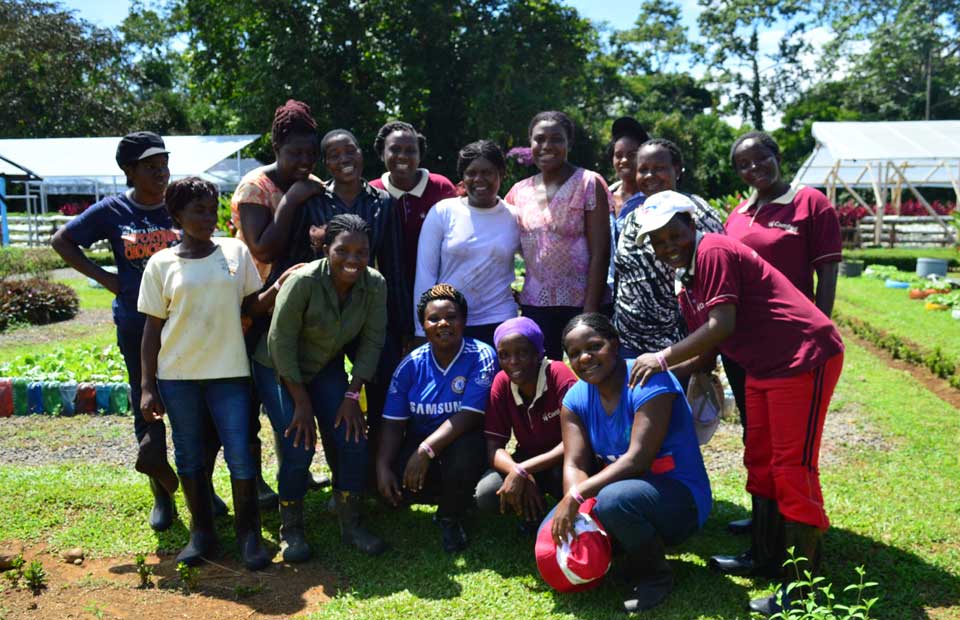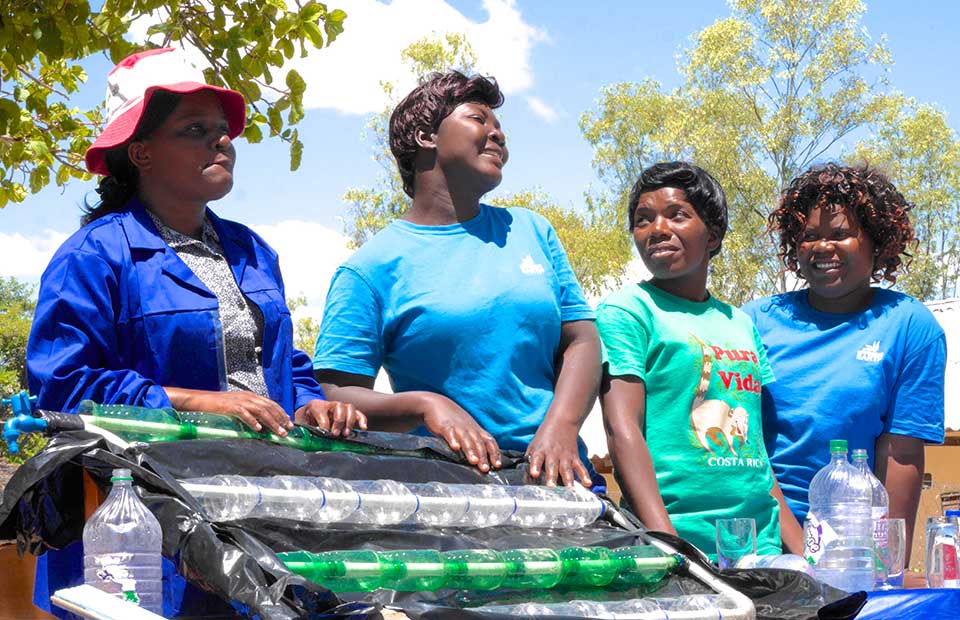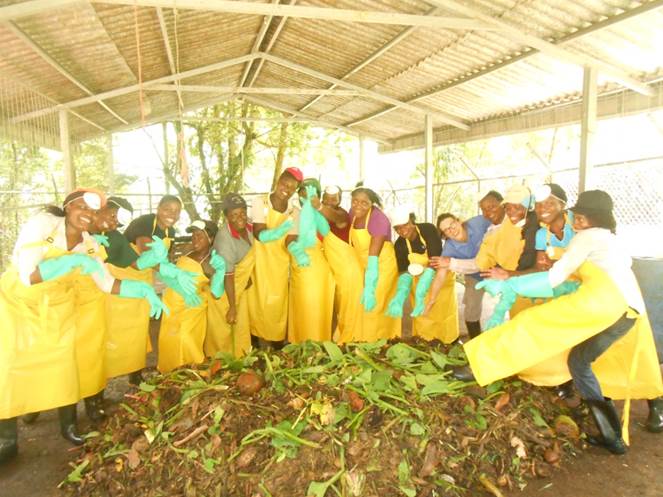From EARTH to Africa – Leading Lessons in Sustainable Agriculture

CAMA members on campus at EARTH University in Costa Rica, October 2014
In January 2015, Camfed’s partner communities in Malawi and Zimbabwe experienced first-hand the mercilessness of changing weather patterns as villages and schools flooded.
Subsistence farmers in the poorest, most hard-to-reach rural communities in sub-Saharan Africa are also those hardest hit by climate change. The need for strategies to adapt to such disasters has never been greater. For Camfed, this means partnering with like-minded organizations which are uniquely positioned to address the challenges farmers and villagers face. And so last year, 15 young women from sub-Saharan Africa travelled to EARTH University in Costa Rica to attend a tailored 6-week course in Sustainable Agricultural Systems. Now, they are cascading their knowledge throughout their districts.
How to Thrive in a Changing Landscape
Many of the members and families of Camfed’s extraordinary CAMA alumnae network of over 33,000 young educated women depend on subsistence agriculture for their livelihoods. Camfed supports girls through school, and onwards into independence and leadership. “We asked ourselves how we could enable young women to stay in their communities and make a success of their farming ventures by learning how to cope with the challenges of changing landscapes, and helping others to do the same,” explains Regina Lialabi, National Director of Camfed Zambia. “The answer came through EARTH, a non-profit university in Costa Rica, perfectly aligned with Camfed’s values. In this partnership we have brought together the experience of CAMA members farming in rural Africa with EARTH’s expertise in sustainable agriculture as a foundation for building more resilient communities in the face of climate change.”
A Bespoke Course Tailored to the Needs of Rural Communities
EARTH University offers a unique program in agricultural sciences and natural resources management, designed for young people from rural areas who want to contribute to sustainable development, justice and prosperity in their communities.
Over two years, in a joint project with The MasterCard Foundation, EARTH professors and faculty engaged deeply with CAMA members across Zambia, Zimbabwe, Tanzania and Ghana to understand their background, the materials to hand, the crops they grow, and their families’ circumstances. They then developed an intensive six-week train-the-trainer course entitled “Integrated Sustainable Agricultural Systems.” The first of its kind, the program was designed specifically around the technical needs, interests and challenges of marginalized women farmers and their communities.
Kim Graham from Camfed worked intensively with the team in Costa Rica, as well as with CAMA members across Africa, in order to make their journey of knowledge a huge success. “It’s such a pleasure to work with an organization that shares our values,” she says. “EARTH is an ideal partner – flexible in its approach, open to learning, and just as full of enthusiasm about this project as we are.”
Ronald Segura Sojo, who led the project at EARTH University and worked closely with Kim, agrees, “We have learned as much from these young women and their communities as they have learned from us. Unlike other students, most of them already had extensive experience of running farms and businesses in an isolated rural setting. We wanted to add value and design solutions that work in the rural African context – solutions that don’t re-invent the wheel, but complement tried and tested methods.”
Building and Extending Indigenous Knowledge
EARTH University understands, values, and extends the knowledge of the land and the environment that has allowed indigenous communities to survive in the harshest of conditions. The young women who travelled to Costa Rica may have been far away from home, but they recognized many home truths in their lessons. “My mother never went to school, but when I went to EARTH I was excited to hear many lessons my mother had taught me about farming,” Clarah from Zimbabwe noted. Delivered as part of a formal curriculum, EARTH gives new status and prominence to ancient knowledge, building on – and restoring – practices that work in harmony with the environment.
During their six weeks in Costa Rica, the young women also developed their leadership, teamwork, and community development skills. They gained hands-on experience in crop and animal production, waste management and renewable energy. Since then, they have been busy cascading the skills and knowledge gained throughout their districts and beyond, showing that there is a future in smart farming for educated young people, and that this future is very much built on a rich past.
At EARTH, one of the most useful things I have learned about is animal production – the amount of land they need, and how to control disease… I think being at EARTH will bring a good change to my community, increase income generation and even uplift us out of poverty
Rebecca from Zambia, a rice, groundnut, and poultry farmer
Experts in the Field
In the first five months since their return, CAMA members have already inspired over 4,800 farmers to make the changes that will improve food security and lead to profitable farming, raising the status of subsistence farming, as well as the prospect of lifting whole families out of poverty. The young women are delivering and demonstrating their knowledge with enthusiasm and dedication. By showing their learning in action on their own farms, they are gaining new respect as experts in the field. In spite of recent droughts, Annie from Zambia said that applying her knowledge resulted in an “amazing” yield, and she has already extended her cassava farmland by one hectare.
National Reach
In Zambia, the Ministry of Agriculture was so impressed with the knowledge of the returning CAMA members that, together with Camfed, it supported them to travel to five districts, sharing their skills to farmers in the most remote areas.

At CAMA National Committee and community sessions in Zimbabwe, the EARTH trainees were greeted with unfettered enthusiasm as they demonstrated solar water heating, water purification, and vegetable and fruit drying. They showed their peers how to build a Patsari stove, which improves fuel efficiency and cleanliness, and how to construct a ‘pot in pot’ chiller, a system used in Egypt over 4,000 years ago.
I helped the Mother Support Groups who are doing a flower growing project. They are growing flowers which are used to produce perfumes and lotions. I educated them on supply chains, value chains and on the need to develop different products in order to provide unique produce from the flowers.
Clarah from Zimbabwe, a sugar bean farmer
Students Teaching Teachers
Among the 1,500 people already trained in Tanzania were parents, students, graduates, village banking leaders, and teachers. In an exciting reversal, Teacher Mentors, who look after vulnerable students supported by Camfed in schools, are now being taught by those young women they may have prevented from dropping out of school. CAMA members taught topics as diverse as animal production, crop production, waste management, and community development. Teacher Mentors were particularly excited about the prospect of being able to grow crops more easily, with fewer expensive inputs, in order to provide nutritious meals for more children, whose hunger prevents them from learning.
For my community, from what I’ve learned I don’t need to be selfish, I want to go and educate my fellows. When I educate the community they will be able to feed their families. If a child gets a good meal, they will be able to concentrate in class… I am very committed to my children. With increased income, I will be able to educate them until they become professors and teach more people.
Asha from Tanzania, an agricultural entrepreneur
The Road Ahead
“Through this innovative partnership with Camfed and The MasterCard Foundation, EARTH University has broadened its admissions process for Africa, and deepened its understanding of how it can play a constructive role in community-led development and poverty reduction initiatives on the continent,” says Ronald Segura Sojo. Camfed and EARTH University are in the process of further extending their relationship, with the aim of replicating their innovative pilot. Professors from EARTH University have already travelled to Africa to meet with and learn from CAMA members who completed the six-week-course. At the same time, four CAMA members are currently pursuing degree courses at EARTH, and another six have just been successful in their applications, and have received full scholarships from The MasterCard Foundation. Camfed is supporting many more to apply.
It’s like, you hear and you forget. You see and you remember. You do and you understand. Now we are here we want to do things ourselves so we can go back and transform our communities.
Malumbo from Malawi, who joined EARTH University as a degree student in 2014
Find out More
Kiva Fellows Blog: Costa Rican Kitchen Design Hits Zimbabwe
The MasterCard Foundation: Partnership with EARTH University

